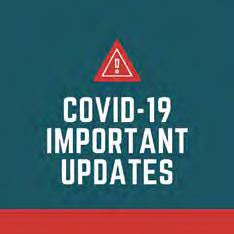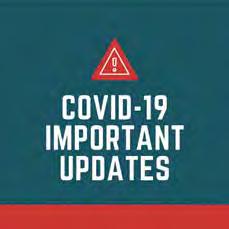
11 minute read
COVID-19: Important Updates CONFERENCE PROGRAM MISSION for Industry Members 2019 NOVEMBER 14 & 15
COVID-19: Important Updates for Industry Members
For more comprehensive information, including links and the most up-todate news, visit our website at www.landscape-alberta.com and click on the “COVID-19 Industry Updates” button. We update this page regularly as new information comes available.
As of March 18, 2020
COVID-19 Special Member Briefing
This special bulletin is intended to assist members in dealing with issues related to COVID-19. As you may know the World Health Organization (WHO) has declared this a pandemic emergency. Given that our industry is gearing up towards the start of the season and welcoming back many employees, it is crucial to be well informed. COVID-19 protocols are rapidly changing, and we will endeavour to keep you informed as things change.
In the spirit of every challenge being an opportunity, the restrictions on international travel are like attitudes post 9/11. In the year following that event there was a strong trend to staycation and people invested heavily in their outdoor living spaces instead of travel. What a great time to garden or enjoy your backyard. How to manage in the workplace


• Ensure you have hand washing protocols in place • Ensure employees understand their responsibility to report if they are feeling ill or of any activities that put them at risk of COVID-19. • Communicate with your employees about HR policies around sick leave (if any). • Ensure employees understand why they may need to self-isolate, support them in this decision and make sure they understand they will be sent home from work if they present with symptoms. • Share the AHS Self-assessment tool with employees - https://www.albertahealthservices.ca/ topics/Page16944.aspx • If an employee has to self-isolate, employees and employers should work together to explore alternate working arrangements: • W orking from home or remotely • D oing work that requires limited contact with other • If an alternate working arrangement is not possible, employees can use paid sick time, if available. (see below for changes to Paid Sick Leave in AB). • T he Government of Canada has removed wait times on Employment Insurance which can be used for self-isolation or care leaves. • L imit or restrict visitors to the business operation (not customers) • Consider restrictions on business and personal travel • C ontinue to follow recommendations provided around maintaining biosecurity and food safety standards. • Businesses that provide housing for their workers will need to ensure their risk management
plan considers large numbers of employees being quarantined or requiring health care. • BC has a COVID-19 resource for employees in Spanish - https://www.healthlinkbc.ca/hlbc/ files/documents/healthfeature/ hf_040_coronavirus_covid-19-s.pdf
Employment rules changes
The Government of Alberta will be implementing paid, job-protected leave. Details of how these changes will take effect will be provided in the coming days.
Changes to the Employment Standards Code will allow employees to take 14 days of paid, job-protected leave if they are:
• required to self-isolate • sick or caring for a loved one with COVID-19
To be eligible, employees:
• w ill not be required to have a medical note • do not need to have worked for an employer for 90 days
This leave covers the self-isolation period recommended by Alberta’s chief medical officer. They recognize this could put pressure on employers and are working towards a solution to address these challenges.
Best Practices for Cleaning and Prevention
General Cleaning
• Increase daily cleaning and disinfection of common areas and surfaces. Pay particular attention to doorknobs, light switches, staff rooms, desktops, washrooms and other high touch surfaces. • Cleaning refers to the removal of visible dirt, grime and impurities. Cleaning does not kill germs but helps remove them from the surface. • Disinfecting refers to using chemical to kill germs on surfaces. This is most effective after surfaces are cleaned. Both steps are important to reduce the spread of infection. • Use a disinfectant that has a Drug Identification Number (DIN) and a virucidal claim. Be sure to follow the instructions on the label to disinfect effectively. Alternatively, you can prepare a bleach water solution with 100 ml of unscented household bleach per 900 ml of water. • B e sure to use / take the appropriate precautions when using chemicals for cleaning and disinfecting. Consult the product Safety Data Sheets.
Prevention
• Wash your hands often and well (at least 20 seconds) • A void touching your face, nose, or mouth with unwashed hands • A void close contact with people who are sick • C lean and disinfect surfaces that are frequently touched • Stay at home and away from others if you are feeling ill • When sick, cover your cough and sneezes and then wash your hands (sneeze or cough into your elbow or a tissue)

Links to Health Resources
• Up to date info from Alberta Government https://www.alberta.ca/ coronavirus-info-for-albertans.aspx • Alberta Health Services – COVID-19 Resources https://www.albertahealthservices.ca/ topics/Page16997.aspx • Business continuity planning - https://www.ccohs.ca/publications/ PDF/businesscontinuity.pdf • H ealth Canada Risk Prevention - https://www.canada.ca/ en/public-health/services/ diseases/2019-novel-coronavirusinfection/prevention-risks.html • Health Canada OHS Guidelines - https://www.canada.ca/en/ employment-social-development/ corporate/notices/coronavirusoccupational-health-safety.html • Health Canada Travel Guide - https://www.canada.ca/en/ public-health/services/diseases/2019- novel-coronavirus-infection/ latest-travel-health-advice.html • Trade Commissioner of Canada – Advice for businesses https://www.tradecommissioner.gc.ca/ campaign-campagne/ ressources-entreprises-COVID-19- business-resources.aspx?lang=eng • World Health Organization Info - https://www.who.int/news-room/qa-detail/q-a-coronaviruses
Economic Response Package from Canadian Government for COVID-19
March 18, 2020 – The Government of Canada has announced details on the $82 billion aid package for Canadians and Businesses. This includes the information below that details how and when assistance will be arriving. We encourage all employers to share the resources below with employees. Each company will have to best decide how to achieve a contingency plan with help from these aid programs. Combined support for both employers and employees offers the best option to maintain health concerns with being able to have a business to return to.
There is a potential as the pandemic progresses that all non-essential businesses will be forced to close.
Please ensure you are taking that possibility in to consideration when planning for the next weeks and months.
The full details on the Government of Canada Economic Response Package can be found at the link below. Please visit there directly for more details. https://www.canada.ca/en/ department-finance/news/2020/03/ canadas-covid-19-economic-response-plan-support-for-canadians-and-businesses.html
Visit our website for more information and links to important resources.
As of March 19, 2020
Support for Albertans
• Emergency Isolation Support – a one-time payment via online application that will help bridge the gap until Federal funds are available in early April. • Utility payment holiday – Defer payment on electricity and natural gas bills regardless of provider for up to 90 days. • Student Loan Repayment – The Alberta Student repayments will be paused for 6 months beginning March 30, 2020. No interest will accrue during this period. • A TB Financial customers – Will be able to defer loan, line of credit and mortgage payments by up to 6 months.
Full details here - https://www.alberta.ca/covid-19- supports-for-albertans.aspx
Work Sharing
This Federal program allows for employees to remain working during times where there is a reduction in normal levels of business activity. Employees wages are supplemented by EI payments. This has been expanded to 76 weeks due to COVID-19 related issues. Please note this does not apply to seasonal staff and must be by mutual agreement between employer and employees.
Full details here - https://www.canada.ca/en/ employment-social-development/ services/work-sharing.html
As of March 20, 2002
Canada provides update on exemptions to travel restrictions to protect Canadians and support the economy
The Government of Canada is providing an update on travel restrictions put in place to stem the spread of COVID-19. Exemptions to the air travel restrictions will apply to foreign nationals who have already committed to working, studying or making Canada their home, and travel by these individuals will be considered essential travel for land border restrictions. The exemptions include: • seasonal agricultural workers, fish/ seafood workers, caregivers and all other temporary foreign workers • international students who held a valid study permit, or had been approved for a study permit, when the travel restrictions took effect on March 18, 2020 • permanent resident applicants who had been approved for permanent residence before the travel restrictions were announced on March 16, 2020, but who had not yet travelled to Canada

In addition, a temporary modification is being made to the Labour Market Impact Assessment process for agriculture and food processing employers, as the required 2-week recruitment period will be waived for the next 6 months.
We are also increasing the maximum allowable employment duration for workers in the low-wage stream of the Temporary Foreign Worker Program from 1 to 2 years. This will improve flexibility and reduce the administrative burden for employers, including those in food processing.
To safeguard the continuity of trade, commerce, health and food security for all Canadians, temporary foreign workers in agriculture, agri-food, seafood processing and other key industries will be allowed to travel to Canada under exemptions being put in place to the air travel restrictions that took effect on March 18.
In addition to health screening protocols before travel, all individuals entering from abroad must isolate for 14 days upon their arrival in Canada. Allowing foreign workers to enter Canada recognizes their vital importance to the Canadian economy, including food security for Canadians and the success of Canadian food producers. The arrival of farm workers and fish/seafood workers is essential to ensure that planting and harvesting activities can take place. There will always be jobs available for Canadians who wish to work on farms and at food processing plants.
Those affected by these exemptions should not try to travel to Canada immediately. We will announce when the exemptions are in place, which we anticipate will be early next week.
These exemptions follow others announced earlier this week, for: • f oreign nationals travelling at the invitation of the Canadian government for a purpose related to the containment of COVID-19 • close family members of Canadian citizens • close family members of Canadian permanent residents
• a person who is authorized, in writing, by a consular officer of the Government of Canada to enter Canada for the purpose of reuniting immediate family members • a person registered as an Indian under the Indian Act • a ccredited diplomats and family members (including NATO, those under the United Nations Headquarters Agreement, other organizations) • air crews • any foreign national, or group of foreign nationals, whose entry would be in the national interest, as determined by the Minister of Foreign Affairs, the Minister of Immigration, Refugees and Citizenship, the Minister of Public Safety • m embers of the Canadian military, visiting forces and their family members • transiting passengers
As of March 24, 2020
The CFIA is prioritizing critical activities during COVID-19 pandemic
The Canadian Food Inspection Agency (CFIA) is taking action to preserve the integrity of Canada’s food safety system, while safeguarding its animal and plant resource base.
The CFIA has activated its business continuity plan, which introduces a temporary suspension of low-risk activities that do not immediately impact the production of safe food for Canadians in order to prioritize critically important services during the ongoing COVID-19 pandemic. The food safety system remains strong.
This approach to temporarily suspend low-risk activities allows the CFIA to continue to safeguard the health and safety of its staff while refocusing efforts in areas of higher risk and towards activities that are critical to the safety of food, as well as animal and plant health.
The Government of Canada is working hard with partners at all levels to respond to the COVID-19 pandemic as it develops. This includes continuing to perform the critical activities and to deliver needed services to preserve the integrity of Canada’s food safety system.


CFIA is prioritizing:
• Food safety investigations and recalls • Animal disease investigations • Inspection services • Export certification • Import inspection services • Emergency management • Laboratory diagnostics in support of the above • L ow risk surveillance or sampling activities (food, plant and animal) • Inspections of preventive control plans and plant and animal inspections in areas of low risk • Low risk labelling and domestic facility inspections • Low risk feed, seed and fertilizer permissions
While the CFIA’s business continuity plan is in place, industry m ust continue to comply with requirements pertaining to food, animal and plant health and remains responsible for the safety a nd quality of the food that it produces, imports and exports. The C FIA is working with industry and is continuing its critical activities so that Canadians continue to have access to safe food during this difficult time.
In an effort to protect the health and safety of its employees and their families and while providing critical services, the CFIA continues to monitor developments regarding the COVID-19 pandemic and to support the efforts of the Canadian and global authorities in their responses by making adjustments to its service delivery plans.
The CFIA understands the concerns of industry and consumers with respect to COVID-19 and the unprecedented impact around the globe on businesses, economies and people and is committed to communicating its ongoing activities.
For more comprehensive information, including links and the most up-to-date news, visit our website at www.landscape-alberta.com and click on the “COVID-19 Industry Updates” button. We update this page regularly as new information comes available.





